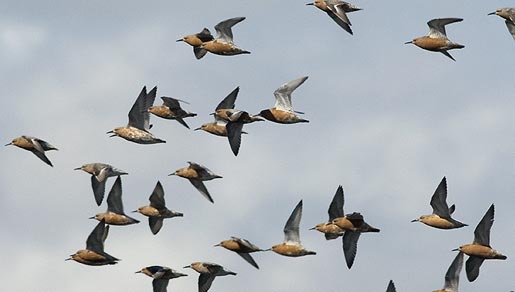EUR 3 million to study effects of natural restoration plans on migratory birds
Theunis Piersma, a Professor of Animal Ecology at the University of Groningen and researcher at the Royal Netherlands Institute for Sea Research (NIOZ), has been awarded EUR 3 million from the Wadden Fund for the project Metawad-1. This project will examine the effects of natural restoration plans on migratory birds. The NIOZ, located on Texel Island in the Wadden Sea, will lead the project, with Professor Piersma as the Project Manager. Metawad-1 will last for five years, and be carried out by a consortium made up of NIOZ, the University of Groningen, The Netherlands Institute of Ecology (NIOO), The Nature Information Foundation (Stichting Natuurinformatie) and the Dutch Centre for Field Ornithology (SOVON).
Tracking migratory birds for 15 years
Based on spatial models, the project will investigate the effects of changes in different types of habitats in the Wadden Sea on the behaviour, physiology, survival and population development of migratory birds. Examples of habitats include sandy or muddy tidal flat soils, mussel or oyster banks, sea grass fields and tidal marshes. The project will assess the effectiveness of current natural restoration programmes, building on a series of observations made regarding migratory birds over the past 15 years. These observations have focused on the migratory birds’ use of different habitats, their survival chances and their reproductive success.

Global interaction
The effects of natural restoration will be evaluated from an international perspective. Specifically, the project will look at the ecological interaction between the WaddenSea and other regions, such as nesting areas above the polar circle and wintering areas in the tropics and sub-tropics, particularly the Banc d'Arguin National Park in Mauritania.
For more information, please visit www.waddenzee.nl or contact Prof. Theunis Piersma at theunis.piersma@nioz.nl.
More news
-
27 January 2026
ERC Proof of Concept grant for Maria Loi
-
26 January 2026
Science for Society | The AI chip of the future
